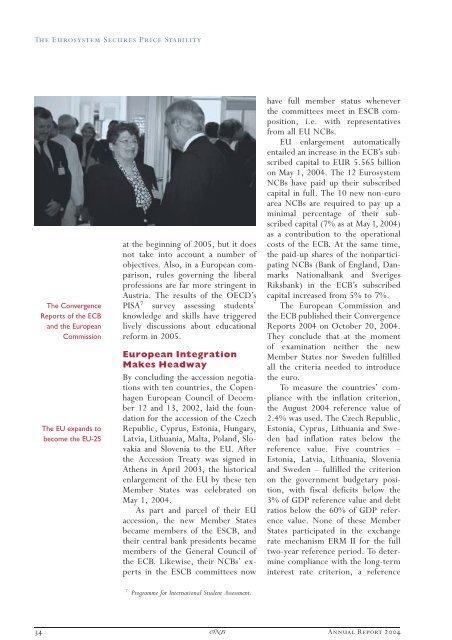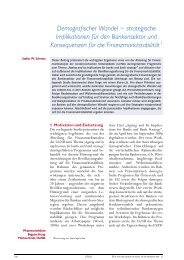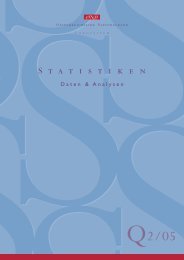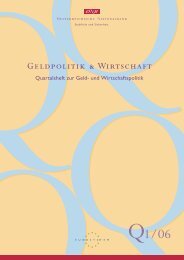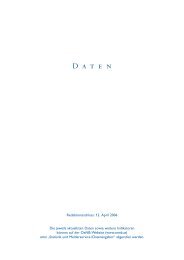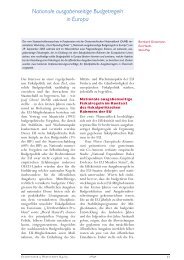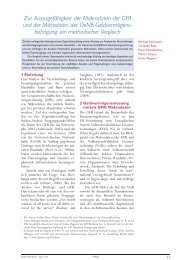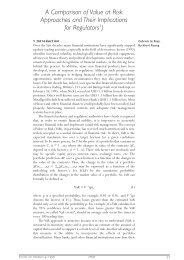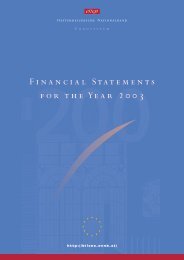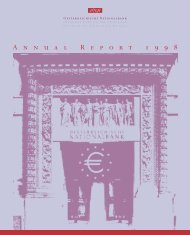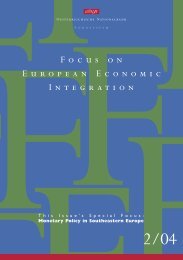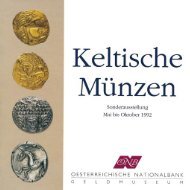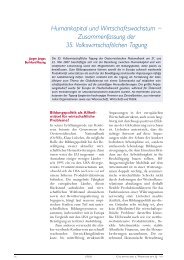Create successful ePaper yourself
Turn your PDF publications into a flip-book with our unique Google optimized e-Paper software.
The Eurosystem Secures Price Stability<br />
The Convergence<br />
<strong>Report</strong>s of the ECB<br />
and the European<br />
Commission<br />
The EU expands to<br />
become the EU-25<br />
at the beginning of 2005, but it does<br />
not take into account a number of<br />
objectives. Also, in a European comparison,<br />
rules governing the liberal<br />
professions are far more stringent in<br />
Austria. The results of the OECDÕs<br />
PISA 7 survey assessing studentsÕ<br />
knowledge and skills have triggered<br />
lively discussions about educational<br />
reform in 2005.<br />
European Integration<br />
Makes Headway<br />
By concluding the accession negotiations<br />
with ten countries, the Copenhagen<br />
European Council of December<br />
12 and 13, 2002, laid the foundation<br />
for the accession of the Czech<br />
Republic, Cyprus, Estonia, Hungary,<br />
Latvia, Lithuania, Malta, Poland, Slovakia<br />
and Slovenia to the EU. After<br />
the Accession Treaty was signed in<br />
Athens in April 2003, the historical<br />
enlargement of the EU by these ten<br />
Member States was celebrated on<br />
May 1, <strong>2004</strong>.<br />
As part and parcel of their EU<br />
accession, the new Member States<br />
became members of the ESCB, and<br />
their central bank presidents became<br />
members of the General Council of<br />
the ECB. Likewise, their NCBsÕ experts<br />
in the ESCB committees now<br />
7 Programme for International Student Assessment.<br />
have full member status whenever<br />
the committees meet in ESCB composition,<br />
i.e. with representatives<br />
from all EU NCBs.<br />
EU enlargement automatically<br />
entailed an increase in the ECBÕs subscribed<br />
capital to EUR 5.565 billion<br />
on May 1, <strong>2004</strong>. The 12 Eurosystem<br />
NCBs have paid up their subscribed<br />
capital in full. The 10 new non-euro<br />
area NCBs are required to pay up a<br />
minimal percentage of their subscribed<br />
capital (7% as at May 1, <strong>2004</strong>)<br />
as a contribution to the operational<br />
costsoftheECB.Atthesametime,<br />
the paid-up shares of the nonparticipating<br />
NCBs (Bank of England, Danmarks<br />
Nationalbank and Sveriges<br />
Riksbank) in the ECBÕs subscribed<br />
capital increased from 5% to 7%.<br />
The European Commission and<br />
the ECB published their Convergence<br />
<strong>Report</strong>s <strong>2004</strong> on October 20, <strong>2004</strong>.<br />
They conclude that at the moment<br />
of examination neither the new<br />
Member States nor Sweden fulfilled<br />
all the criteria needed to introduce<br />
the euro.<br />
To measure the countriesÕ compliance<br />
with the inflation criterion,<br />
the August <strong>2004</strong> reference value of<br />
2.4% was used. The Czech Republic,<br />
Estonia, Cyprus, Lithuania and Sweden<br />
had inflation rates below the<br />
reference value. Five countries —<br />
Estonia, Latvia, Lithuania, Slovenia<br />
and Sweden — fulfilled the criterion<br />
on the government budgetary position,<br />
with fiscal deficits below the<br />
3% of GDP reference value and debt<br />
ratios below the 60% of GDP reference<br />
value. None of these Member<br />
States participated in the exchange<br />
rate mechanism ERM II for the full<br />
two-year reference period. To determine<br />
compliance with the long-term<br />
interest rate criterion, a reference<br />
34 ×<br />
<strong>Annual</strong> <strong>Report</strong> <strong>2004</strong>


